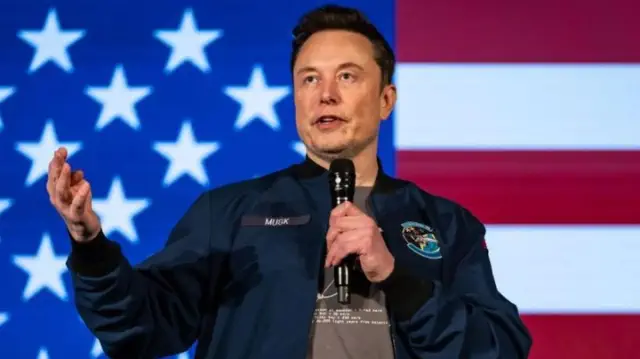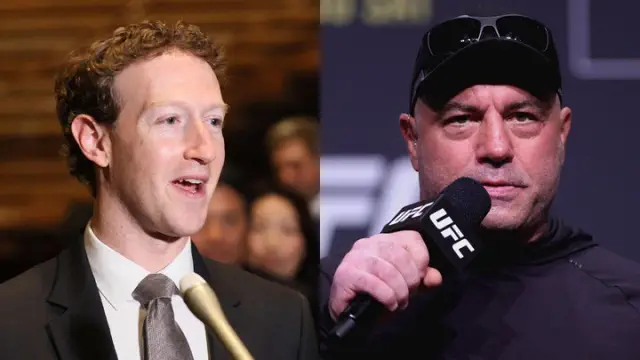
View pictures in App save up to 80% data.
A version of this story appeared in CNN Business’ Nightcap newsletter. To get it in your inbox, sign up for free here.
New York CNN —
Facebook is full of AI slop. X is full of “free thinkers” peddling conspiracies. Google’s search results are telling us to eat rocks. More and more, it feels like the internet has gone bad.
A growing theory gaining traction is known as "enshittification."
The term, coined in 2022 by the author, journalist and activist Cory Doctorow, refers broadly to the deterioration of services (especially online) as a result of giant companies extracting maximum profits from their customers. In a 2023 essay for Wired, Doctorow laid out the basic arc of enshittification, or the process by which platforms die.
"Initially, they treat their users well; next, they exploit those users to enhance benefits for their business clients; ultimately, they turn on those business clients to reclaim all the advantages for themselves. In the end, they face demise."
To put it differently: When products are launched, they are often at their best, as businesses strive to attract a large customer base to reach their ambitious growth targets. After capturing a significant number of users, the focus shifts toward maximizing benefits for business associates, increasing profit margins, and allowing the product to deteriorate over time. Ultimately, the company exhausts its potential for profit from its partners as well, leading to the product's decline and eventual irrelevance.
Once you wrap your head around the idea, you start to see enshittification all around — not only online, but across the economy, in services that have been picked over by private equity (vet clinics, nursing homes, prisons, countless other industries) or in the products peddled by highly concentrated industries. The Australian dictionary Macquarie even crowned it the 2024 word of the year, noting its power to capture “what many of us feel is happening to the world and to so many aspects of our lives at the moment.”
On Tuesday, shortly after Meta’s CEO announced a widely criticized plan to dispense with fact-checkers, I spoke with Doctorow about the future of social media and how “enshittification” can help us make sense of our collective online angst.
The interview below has been condensed for brevity and clarity.
Nightcap: Could you give me your your cocktail-party-level introduction to “enshittification”?
Cory Doctorow: I think of enshittification as a theory about what happens when you have power without consequence.
For an extended period, we have bolstered the influence of large corporations by easing antitrust regulations, permitting mergers, and enabling predatory pricing. This has facilitated the growth of companies across various sectors, not limited to just the technology industry.
Nightcap: What does that look like, in real life?
Doctorow: There’s a law, the Digital Millennium Copyright Act, that makes it illegal to break digital rights management. So for example, if Audible (which is owned by Amazon) sells you one of my audiobooks, they require that it have digital rights management that locks it to Audible’s platform forever — you can’t unlock it, quit Audible and take your books with you.
If I provide you with a means to bypass the restrictions on the audiobook, I would be engaging in illegal activity that could result in a felony charge, leading to a potential five-year prison term and a fine of up to $500,000.
Although I hold the rights to that work, Amazon, as the intermediary that facilitated the sale, possesses greater intellectual property rights to it than I do.
This legislation is designed to enable major corporations to use regulatory measures to their advantage, targeting rivals, their own employees, and their customers to preserve their dominance. It represents a breakdown of accountability — they are untroubled by concerns for their workforce or regulatory scrutiny. Additionally, they have acquired all their competition.
Nightcap: Meta would seem like a kind of textbook case of enshittification. Facebook used to feel like a premium service, but the last few years it’s felt like it’s lost the plot.
Doctorow: Meta is a great example because they go through this pretty neat set of stages… They had this very straightforward value prop, which was like, just tell us who matters to you, and we’ll show you everything they post. And their pitch to the general public was, Facebook is like MySpace, but we won’t spy on you.
Nightcap: Right, that feels very much like aughts-era Facebook, when we could all just see our friends and enjoy the virtual connection. What changed?
Doctorow: Facebook at a certain point goes to publishers and says, create a Facebook page, post short excerpts to it, don’t worry about how many people follow you — we’re going to recommend it to users. So we’re going to show users things that they never asked to see in order to take some value away from them and give it to publishers.
Advertisers experience a similar scenario. Facebook not only utilizes surveillance data to enhance targeting for advertisers, but also makes significant investments in anti-ad-fraud measures and support services. If your ads aren't yielding results, they will assist you in identifying the issues. Additionally, if you're being scammed, they will work with you to recover your funds.
As you can observe, the users become increasingly intertwined with one another. They offer each other such significant value that they find it difficult to part ways, even when the quality of the service is steadily declining.
Many people seem to stop at the idea that "Facebook has a mind control weapon, they're manipulating your dopamine pathways, you're trapped in their platform, and they'll sell you off to advertisers."
The proof supporting the idea of "hacking your dopamine loops" is rather limited. In contrast, there is significantly stronger evidence suggesting that individuals prioritize their friendships over any disdain they may have for Mark Zuckerberg, which is why they continue to use the platform.
Nightcap: Your theory adds a third step here, where Facebook also turns its back on advertisers, too?
Doctorow: Right, once the advertisers were fully committed to a Facebook strategy, advertising got way more expensive and the amount of ad fraud you got was crazy. So the advertisers are getting screwed, the publishers are getting screwed, the end users are getting screwed.
Nightcap: I’m not asking you to look into a crystal ball here, but if you had to speculate, what’s next for Facebook or other decaying platforms?
Doctorow: Zuckerberg is insulated from the consequences of making bad choices until he’s not, right? Until things reach a breaking point, and then he tends to panic. Tech calls these panics “pivots,” but they’re just the outcome of being the CEO of a company that posts anemic growth or even a contraction in its user base and sees (Wall Street) just go nuts on you.
Initially, it was the Metaverse… akin to an unsuccessful video game that cost billions to develop. Zuck was able to pursue this venture because he holds a majority of the voting shares and has significant cash reserves at his disposal.
And now we’re seeing these weird announcements that they’re going to have AI -generated users who are going to interact with you. This is, again, a visibly terrible idea.
It might serve as a means to sustain ongoing growth if users are willing to accept it. However, the balance that Zuck has aimed for, both with Facebook and Instagram, has led to a platform that is almost so unsatisfactory that users feel inclined to depart.
The anthropologist danah boyd describes how in the last days of MySpace, she could see how when one person who a lot of people talk to would leave, then a whole bunch of people would follow. It wasn’t the only reason they were there, but it was the last thing keeping them there, and then, boom, the bottom falls out and the net just starts to unravel.
Facebook finds itself in a precarious position, attempting to strike a balance between satisfying its shareholders and retaining its user base. They have reached a critical juncture after a series of poor decisions. While I'm not betting against Meta's stock, I believe they are heading towards a fate similar to that of MySpace, which has become a shadow of its former self. MySpace is still operational, but what remains is largely filled with AI-generated content and spam.
(Note: Meta didn’t respond to Nightcap’s request for comment.)
Nightcap: How are you feeling about the future of tech?
Doctorow: In terms of the future of enshittification, these platforms that have hollowed themselves out, where there’s just no value left in them except this kind of awful lock-in. It’s the old “we go broke a little, and then all at once.”
I genuinely believe there is cause for optimism. As a science fiction author, I'm aware that forecasting is often unreliable. However, in my role as an activist, I focus on identifying the most vulnerable points where significant progress can be achieved, and I pursue those opportunities. Fortunately, there are numerous vulnerable points within the realm of major global technology companies.
I believe the most significant aspect is the possibility of forming a coalition among those frustrated with various monopolies, as the issue extends beyond just the tech industry. People are increasingly upset about monopolies in sectors like groceries, oil, shipping, and eyewear. For instance, EssilorLuxottica dominates the eyewear market, controlling nearly every brand and retail outlet you recognize. They produce over half of all lenses and own EyeMed, the world's largest vision insurance provider, while also hiking glasses prices by a staggering 1,000% over the past ten years.
(EssilorLuxottica has yet to provide a response to Nightcap's inquiry for comment.)
Many individuals are frustrated with the existence of monopolies. If they manage to form a coalition, it could resemble the moment we first encountered the term "ecology" in the 1970s. We came to understand that even if you’re passionate about protecting owls and I’m focused on the ozone layer, we are still advocating for a common cause. Whenever we witness a sudden shift in the world, it's often due to the emergence of a new coalition.










